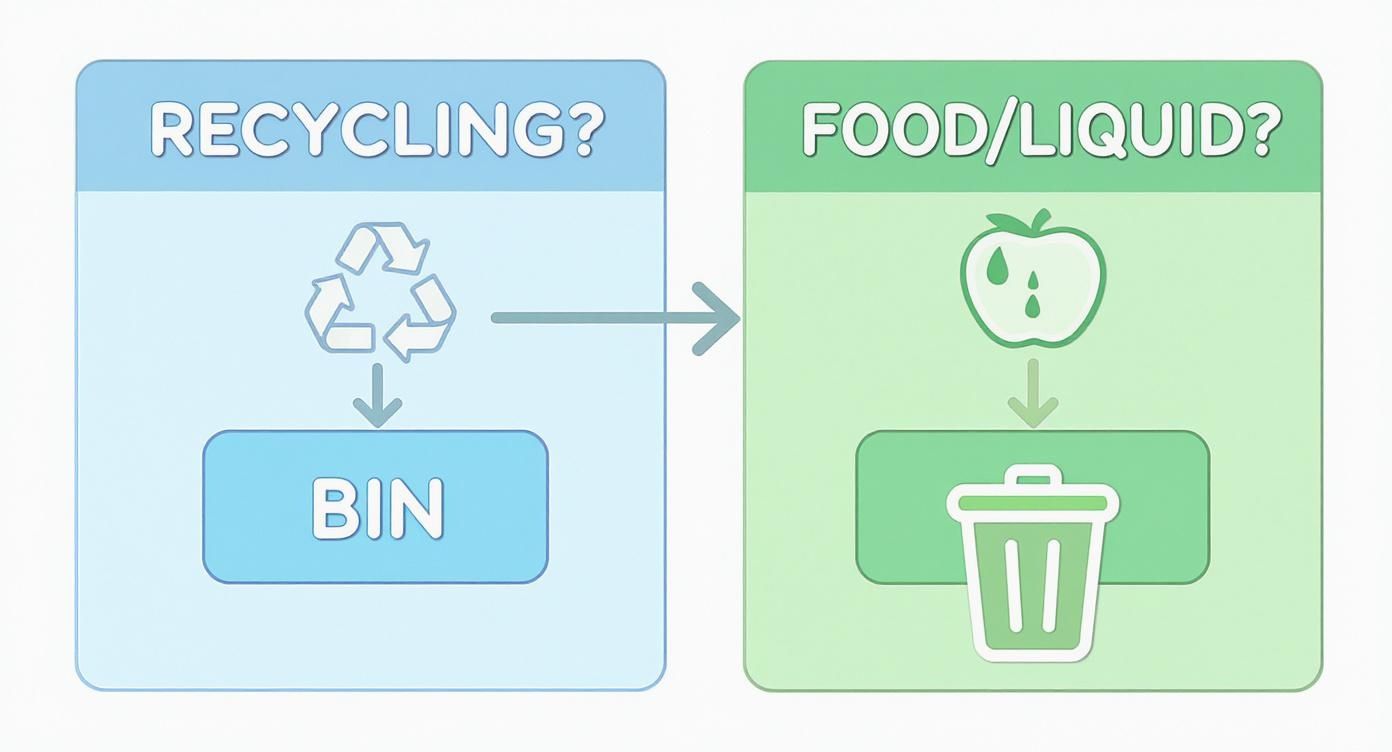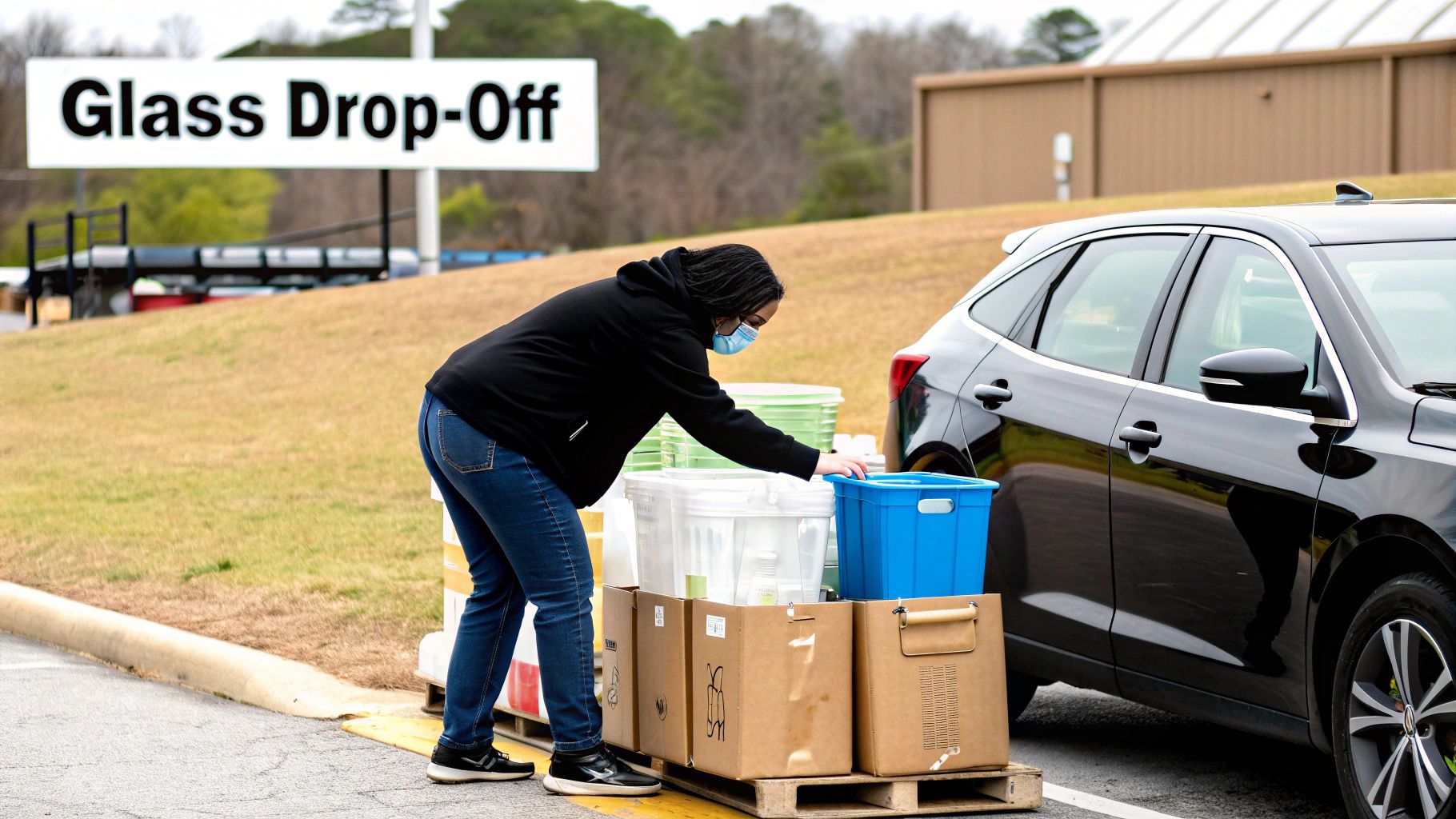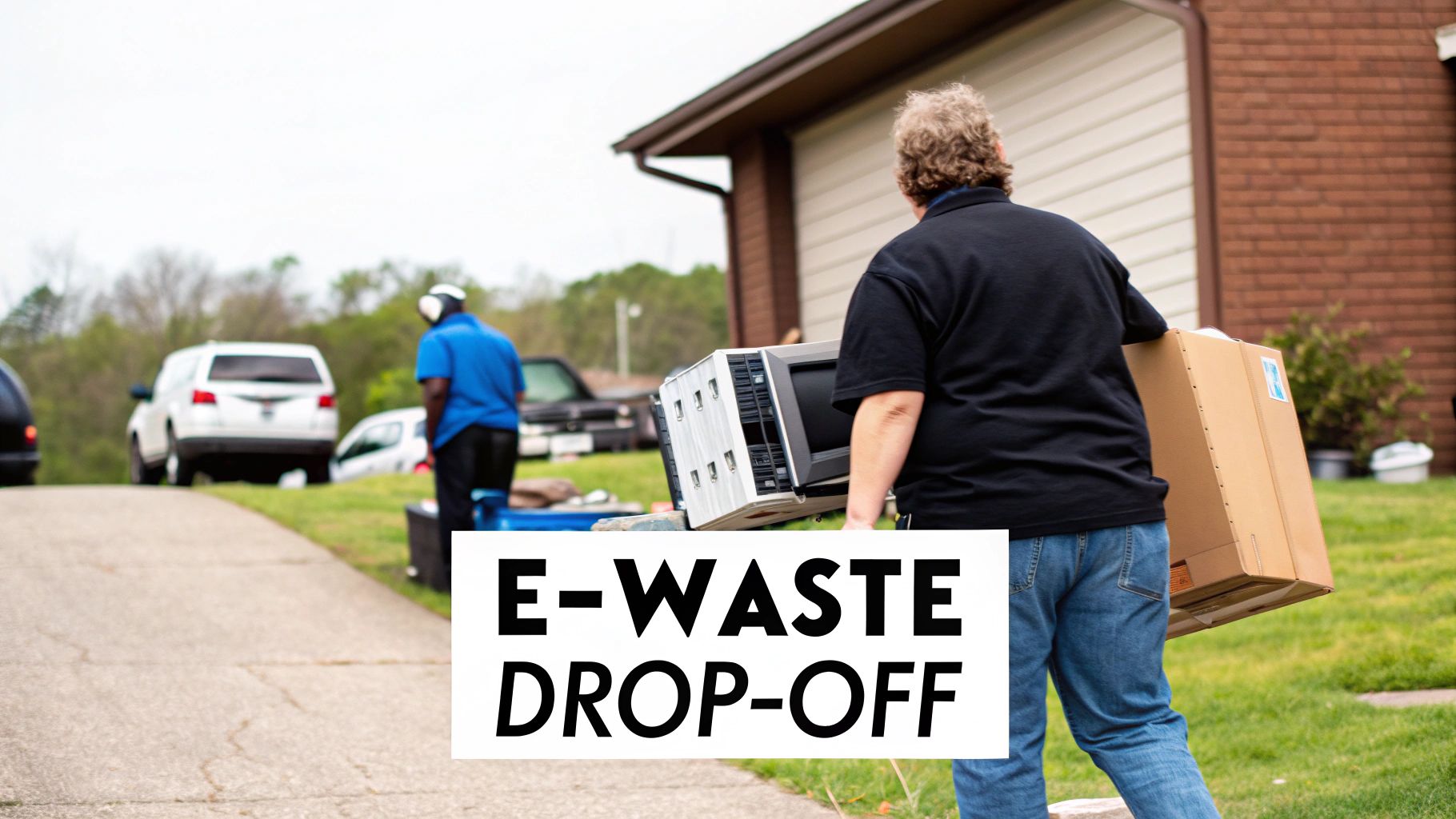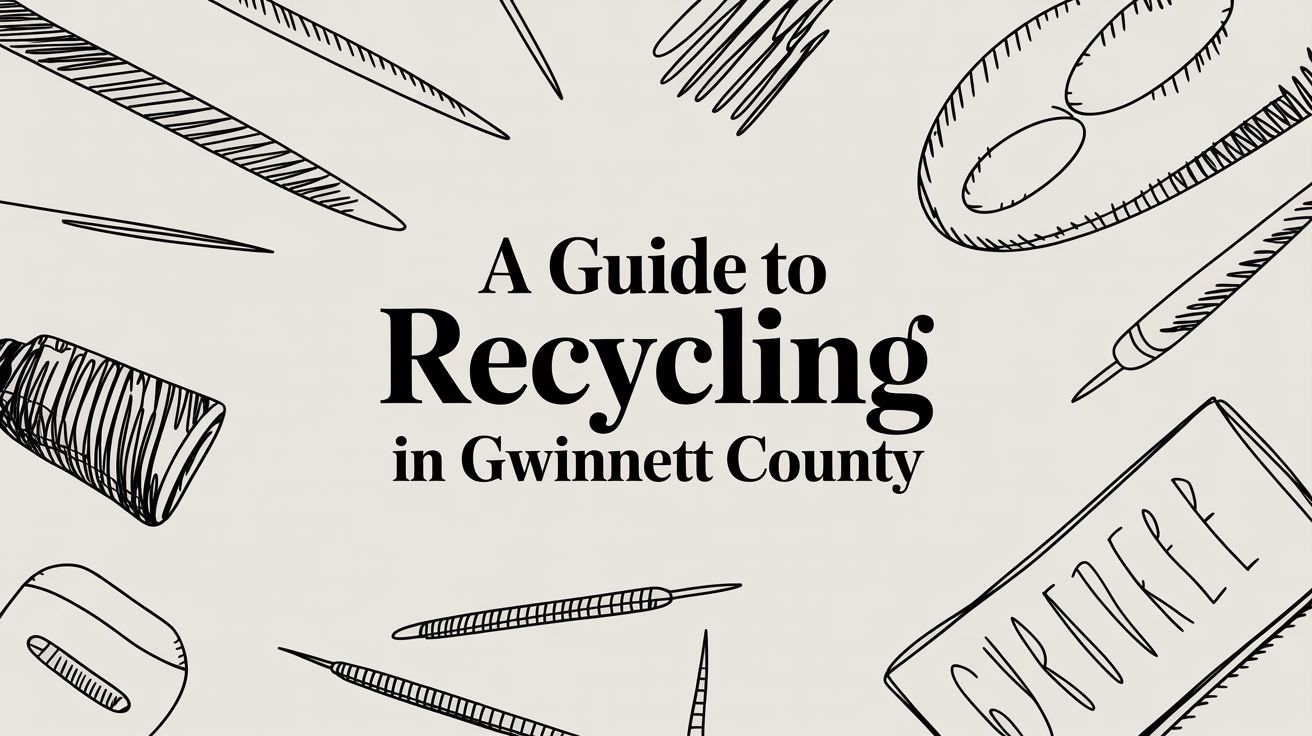If you live in Gwinnett County, you're part of a single-stream recycling program, which makes things pretty straightforward. But getting it right comes down to one simple mantra: clean, empty, and dry.
Following that rule is the difference between your recyclables getting a new life and everything just ending up in a landfill. A rinsed-out milk jug, a flattened Amazon box, that empty can of soup—these are the heroes of the recycling bin.
Mastering Curbside Recycling in Gwinnett County
Let's be honest, we've all stood over the recycling bin, holding an empty container and wondering, "Does this go in here?" Is a pizza box okay? What about this yogurt cup?
The good news is that Gwinnett’s system is designed to be simple. You don't have to sort anything; just toss all the accepted items in together.
The real enemy here is contamination. That’s the industry term for when things that don't belong—like food scraps or the wrong kind of plastic—get mixed in. One greasy container or a stray plastic bag can ruin an entire truckload of perfectly good recyclables. It sounds dramatic, but it's true. That's why taking a few seconds to rinse a jar or scrape out a container is so critical.
What Goes in Your Curbside Bin
Think of your curbside bin as the go-to spot for everyday household packaging and paper. Once you get the hang of what belongs, you'll be a recycling pro.
Here’s a quick rundown of the main things you can confidently toss in your recycling cart:
- Plastics #1 and #2: We're talking about your typical water and soda bottles, milk jugs, and laundry detergent containers. Just look for the number inside the little triangle symbol to be sure.
- Paper and Cardboard: Cereal boxes, junk mail, magazines, and those endless shipping boxes are all good to go. Just break them down flat.
- Metal Cans: Aluminum soda cans and steel food cans (think soup, veggies, or tuna) are highly valuable and easy to recycle.
Still not sure? This handy graphic breaks it down visually and helps you make a quick decision.

The biggest takeaway is that if something is still dirty with food or liquid, it's trash. That residue can ruin a whole batch of paper and cardboard, making it unrecyclable.
Gwinnett County Curbside Recycling Quick Guide
To make it even easier, here's a quick-reference table. Keep these categories in mind next time you're at the bin.
| Material Category | Accepted Items (Examples) | Items to Keep Out (Contaminants) |
|---|---|---|
| Plastics | Bottles, jugs, and containers with #1 or #2 symbols (e.g., water bottles, milk jugs, detergent bottles) | Plastic bags/film, Styrofoam, plastic cutlery, toys, #3-#7 plastics |
| Paper & Cardboard | Flattened cardboard boxes, mail, magazines, newspapers, paperboard (e.g., cereal boxes) | Greasy pizza boxes, used paper towels/napkins, shredded paper (in bags) |
| Metal | Aluminum cans (soda, beer), steel/tin cans (soup, vegetable, pet food cans) | Scrap metal, wire hangers, aerosol cans, aluminum foil/pie pans |
This isn't an exhaustive list, but it covers about 95% of what you'll encounter day-to-day. When in doubt, it's actually better to throw it out than to risk contaminating a whole load.
Common Contaminants to Keep Out
Knowing what to keep out of your bin is just as important as knowing what to put in. These are the repeat offenders that cause major headaches—and shutdowns—at the sorting facilities.
The biggest challenge we face isn't a lack of participation, but a lack of understanding about what contaminates the recycling stream. Removing just a few key items from your bin can dramatically increase the quality of materials we collect.
Here’s what you need to avoid putting in your curbside bin:
- Plastic Bags and Film: These are the #1 problem. They wrap around the sorting machinery and bring the whole operation to a halt. Take them back to the collection bins at your local grocery store.
- Food Waste: Any leftover food or liquid contaminates paper and cardboard, making them worthless for recycling. Scrape and rinse!
- Glass: Gwinnett County does not accept glass in the curbside bins. It breaks easily and contaminates other materials. You'll need to take it to a separate drop-off location.
- Styrofoam: Whether it's a takeout container or packing peanuts, Styrofoam is a no-go. It breaks into tiny pieces and can't be sorted.
Gwinnett County is really stepping up its game to make recycling easier for everyone. Thanks to a $100,000 grant from The Recycling Partnership, the county rolled out 8,400 new, larger recycling carts. The goal? To capture an extra 2.7 million pounds of good, clean recyclables every single year. You can learn more about the specific materials Gwinnett County accepts at https://www.montclaircrew.com/accepted-items/.
Navigating Glass Recycling In Gwinnett
If you've been around Gwinnett County for a while, you probably remember the days of tossing glass bottles and jars right into your curbside recycling bin. So, what changed? Why is glass a no-go for single-stream recycling now?
It really boils down to the messy reality of sorting facilities. When glass shatters during collection and processing—which it almost always does—it creates a huge headache. Tiny shards of broken glass are incredibly abrasive and can wreak havoc on expensive sorting machinery. Even worse, they contaminate entire batches of other valuable recyclables like paper and cardboard, essentially ruining them.
This contamination problem, combined with a tough market for recycled glass, forced a change. Gwinnett County officially pulled glass from its curbside collection program back on July 1, 2018. But that wasn't the end of the story. The county quickly pivoted, partnering with local organizations to create a dedicated drop-off program. This move ensures residents still have a solid, effective way to recycle their glass.
Where To Take Your Glass For Recycling
Instead of getting mixed in with everything else, glass now has its own VIP collection points. Gwinnett County and Gwinnett Clean & Beautiful have set up a network of brightly colored, easy-to-spot drop-off containers specifically for glass bottles and jars.

This system is a massive improvement. By keeping glass separate from the start, we guarantee a "clean stream" of material that can actually be recycled into new products. It’s the key to making glass recycling work. If you're looking for drop-off points for other items, our guide on https://www.montclaircrew.com/recycling-drop-off-center/ is a great resource.
Think of it this way: using these designated drop-off sites directly contributes to a higher quality of recycled material. This clean glass is far more valuable and much more likely to be turned back into new bottles and jars, successfully closing the recycling loop.
Preparing Your Glass For Drop-Off
Getting your glass ready for recycling is refreshingly simple and only takes a minute. A little prep work goes a long way in making sure the material is ready for processing right away.
Just follow these quick steps:
- Give it a quick rinse. Swish a little water inside your bottles and jars to get rid of any food residue or liquid. They don't need to be perfectly clean—just enough to keep things from getting sticky or smelly.
- Leave the labels on. Don't waste your time trying to peel off paper labels. The modern recycling process handles those with no problem.
- Lids can stay. You can leave metal lids on your jars. They get separated out by magnets and other equipment during the crushing and sorting process.
Once you’ve got a small stash, just haul it over to the nearest Gwinnett County glass recycling spot. I find that using a sturdy cardboard box or a reusable bin makes transport safe and easy. You’ll usually see a dedicated container or an island of carts where you can deposit your glass.
How to Handle Hard-to-Recycle Items

Once you've got a handle on your curbside bin and glass recycling, you'll start noticing the other stuff. Every home seems to accumulate a collection of items that just don't fit into the weekly pickup—think plastic grocery bags, old paint cans, or dead batteries.
It’s tempting to just toss these in the bin and hope for the best, but that can cause some serious problems. Trying to recycle these tricky items the wrong way can do more harm than good, leading to equipment damage at sorting facilities and even environmental contamination.
The Problem with Plastic Bags and Film
We've all seen them: plastic grocery bags, bubble wrap, and the clear film wrapped around paper towels. They often have a recycling symbol, which is confusing, but they are a huge no-go for Gwinnett's single-stream system.
These flimsy plastics are notorious for tangling in the gears of sorting machinery. It’s like getting a string caught in a vacuum cleaner—it brings the whole operation to a halt and can cause expensive damage.
Luckily, there’s a simple solution. Most major grocery stores like Kroger, Publix, and Walmart have special collection bins, usually right by the entrance.
- What to bring: Clean and dry grocery bags, bread bags, produce bags, and that plastic overwrap from bottled water cases.
- What to leave out: Dirty bags, frozen food bags, or crinkly plastic like chip bags.
Just bunch them all together in one bag and drop them off the next time you go shopping. Easy.
Managing Household Hazardous Waste
Some of the most critical things to keep out of your trash and recycling are classified as household hazardous waste (HHW). This is the nasty stuff: anything flammable, corrosive, or toxic. We're talking about old paint, pesticides, chemical cleaners, and all types of batteries.
Tossing these in the bin is a huge risk. They can leak, contaminate a whole truckload of recyclables, or even start fires in collection trucks or at the landfill.
Gwinnett County offers a crucial service to residents through its Household Hazardous Waste Collection Days. These events are the only approved way to dispose of these materials safely, preventing environmental harm and ensuring they are processed by certified handlers.
These drive-thru collection events pop up a few times a year, typically at the Gwinnett County Fairgrounds. You'll need to check the official Gwinnett County or Gwinnett Clean & Beautiful websites for the next date, times, and a full list of what they'll accept. It's incredibly convenient and the right thing to do.
Special Item Recycling Solutions in Gwinnett County
To make things clearer, here's a quick guide for some of the most common tricky items we see around Gwinnett. This table should help you figure out what goes where when it's not meant for the curbside bin.
| Item | Why It Can't Be Curbside | Correct Disposal Method/Location |
|---|---|---|
| Plastic Bags/Film | Jams sorting machinery | Return to retail store collection bins (e.g., Publix, Kroger) |
| Paint (Latex & Oil-Based) | Hazardous liquid chemicals | Gwinnett's Household Hazardous Waste Collection Days |
| Household Batteries | Can leak acid and cause fires | HHW Collection Days; some retailers like Home Depot also have drop-offs |
| Old Appliances | Contain hazardous materials (freon) | Check with your waste hauler for bulk pickup or learn about specialized https://www.montclaircrew.com/appliance-recycling/ options. |
This isn't an exhaustive list, but it covers the big ones. The key is knowing that these items have a designated place to go—it just isn't your regular recycling cart.
And don't forget, if an item is still in good, working condition, donation is always the best option. Organizations like Goodwill can give your unwanted goods a second life. If you go this route, their Goodwill Donation Value Guide can be a useful resource. This keeps perfectly good products out of the waste stream entirely.
Your Guide to Electronics and E-Waste Recycling
We’ve all got one. That old laptop gathering dust in the closet, the cracked tablet shoved in a junk drawer, or the ancient tube TV taking up space in the basement.
They all have something in common: they're electronic waste, or e-waste. And the absolute last place they should ever go is your regular trash or recycling bin.
These devices are packed with materials like lead, mercury, and cadmium. If they end up in a landfill, those toxic substances can leach into our soil and groundwater. That's why proper e-waste recycling in Gwinnett County isn't just a good idea—it's essential for keeping our community safe and clean.
Gwinnett County E-Waste Collection Events
One of the simplest ways to get rid of old electronics is through the county's special collection events. Gwinnett County, often teaming up with Gwinnett Clean & Beautiful, hosts several of these throughout the year.
They are usually set up as easy drive-thru events at convenient spots like the Gwinnett County Fairgrounds. You can bring a whole range of items, but it's always a good idea to check the event flyer beforehand just to be sure.
Commonly accepted items include:
- Computers, laptops, and monitors
- Televisions (both flat-screen and older CRT models)
- Printers, keyboards, and mice
- Cell phones and tablets
- VCRs, DVD players, and other home electronics
Keep an eye on the Gwinnett Clean & Beautiful website for upcoming dates. These events are incredibly popular because they offer a free, secure, and straightforward way to make sure your old gadgets are handled correctly.
Permanent Drop-Off Locations and Options
What if you can't make it to a scheduled event? No problem. You still have excellent options for year-round e-waste recycling right here in Gwinnett. Several local businesses and certified recyclers accept electronics from the public, giving you a more flexible solution.
For businesses and residents with IT equipment, specialized recyclers are the way to go. Companies like Montclair Crew offer certified data destruction and environmentally sound processing, which is a huge deal. This service ensures any sensitive information on old hard drives is completely wiped before the device is broken down for recycling. Understanding what electronic waste recycling truly involves is the first step toward making a smart choice for your old devices.
At the end of the day, the goal is simple: keep these materials out of our landfills. By using either a county-sponsored event or a certified local recycler, you're taking a critical step to protect our local environment and recover valuable resources that can be used to make new products.
How Community Action Improves Local Recycling
Doing your part at the curb is a great start, but if we really want to move the needle on recycling in Gwinnett County, it takes community action. When neighbors get involved beyond their own bins, it creates a powerful ripple effect that can drive real, large-scale change and build a more sustainable local culture.
Collective effort turns individual habits into a genuine movement. This can be as simple as helping a neighbor understand the new glass drop-off system or as big as joining a local cleanup event. When a community bands together, it sends a clear message: we care about our environment, and we’re willing to work for it.
The Power of Citizen-Led Initiatives
You don't need to be an expert to make a difference. You just have to show up. Local groups are constantly organizing events that not only directly improve our neighborhoods but also gather crucial data that can shape future policies. This is where the real work gets done.
A fantastic example is the Gwinnett Recycles citizen science project from 2020, which decided to tackle plastic litter head-on. In an amazing show of community spirit, 125 volunteers joined 17 cleanups across all 16 cities in the county. Over nine months, they meticulously logged an incredible 10,042 pieces of plastic litter. This wasn't just about cleaning up; it was about providing invaluable data on where pollution is coming from.
Beyond Recycling: The Reduce and Reuse Mindset
While recycling is a key piece of the puzzle, the most effective way to manage waste is to create less of it in the first place. Shifting your thinking to a "reduce and reuse" philosophy can shrink your environmental footprint far more than recycling alone.
This change doesn't mean upending your life. It's all about making small, conscious choices every day.
- Choose Reusables: Ditch the single-use plastics and opt for a reusable water bottle and coffee cup.
- Shop Smart: Look for products with minimal or no plastic packaging. Buying in bulk is another great way to cut down on waste.
- Rethink Purchases: Before you click "buy," ask yourself if you really need it. Could you borrow, repair, or find it secondhand instead?
Embracing these habits moves us from being reactive recyclers to proactive waste reducers. It’s a subtle but powerful change that, when adopted by many, lessens the strain on our entire waste management system, including the recycling facilities. To truly improve local recycling, understanding how to effectively involve residents is key. Explore the benefits of community engagement that can amplify these efforts.
Ultimately, these actions do more than just manage waste—they preserve resources and prevent pollution before it even starts. They also help us appreciate the true cost of convenience and the long-term impact of our consumption habits. For instance, reducing the demand for new electronics also addresses the growing global issue of e-waste. You can learn more about the environmental impact of electronic waste in our detailed guide.
Common Gwinnett Recycling Questions Answered
Even when you're trying your best to recycle right, some rules can feel a little confusing. A lot of folks across the county run into the same questions during their weekly toss-out. We've put together this quick-reference guide to give you straight answers on the most common recycling hang-ups in Gwinnett.
Think of this as your go-to for troubleshooting what goes in the bin. Nailing these small details makes a massive difference in keeping our collected materials clean and valuable.
Do I Need to Clean My Recyclables?
Yes, but don't worry—you don't need to get out the dish soap and sponge. A quick rinse is all it takes for most containers. The main goal is just to get rid of any food gunk or leftover liquid that could ooze onto everything else.
A greasy peanut butter jar or a half-full bottle of ketchup can easily ruin an entire batch of otherwise perfectly good paper and cardboard. Just a quick swirl of water will do the trick. The mantra to remember is: clean, empty, and dry.
What Happens If I Put the Wrong Item in My Bin?
Tossing the wrong thing in your bin leads to what’s called contamination, and it’s a huge headache for recycling facilities. One single "oops" item can gum up the works in a surprisingly big way.
Plastic bags, for example, are notorious for wrapping around the sorting machinery. When that happens, the entire system has to be shut down so workers can climb in and cut them out by hand. In a worst-case scenario, if a whole truckload of recyclables is too contaminated with trash or food waste, the entire load gets rejected and sent straight to the landfill. That one move unfortunately undoes all the good work from everyone else on your route.
"Wishcycling"—the act of tossing something questionable in the bin hoping it gets recycled—usually does more harm than good. When in doubt, it’s actually better for the whole system if you just put that item in the trash. It's better to lose one item than to contaminate a whole batch.
Are Pizza Boxes Recyclable in Gwinnett?
This is probably the question we hear most often, and the answer is a classic "it depends." Pizza boxes are the perfect case study for how food contamination works.
Here’s the right way to handle them:
- Check the Box: Flip it open and take a good look. Is the top half clean and free of grease stains?
- Separate the Halves: Rip that box in two. The clean, grease-free cardboard top is definitely recyclable. Go ahead and toss it in.
- Trash the Greasy Part: The bottom half, if it's soaked through with grease or has cheese cemented to it, belongs in the trash. That oil and food residue simply can't be separated from the paper fibers during the recycling process.
It only takes a few seconds to separate the box, but it ensures all that clean cardboard can actually be turned into new products.
Where Can I Find the Schedule for Special Recycling Events?
Throughout the year, Gwinnett County hosts special collection days for stuff that can’t go in your curbside bin, like old electronics or household hazardous waste. Knowing when these events happen is key to getting rid of those tricky items.
Your most reliable sources for dates and details are the official county websites.
- Gwinnett County Government Website: Keep an eye on the Solid Waste Management section for official announcements and event calendars.
- Gwinnett Clean & Beautiful: This fantastic organization often partners with the county for collection events and is a great resource for dates, times, and lists of what they'll accept. Check out their event page for the latest info.
A pro tip is to follow both organizations on social media. It's an easy way to get reminders that pop up right in your feed, so you'll never miss a chance to dispose of things responsibly.
For businesses in Gwinnett and the greater Atlanta area looking to responsibly manage their IT assets, Montclair Crew Recycling offers specialized electronics recycling and data destruction services. We help organizations simplify their e-waste programs while ensuring data security and environmental compliance. Learn more about our B2B services at https://www.montclaircrew.com.
